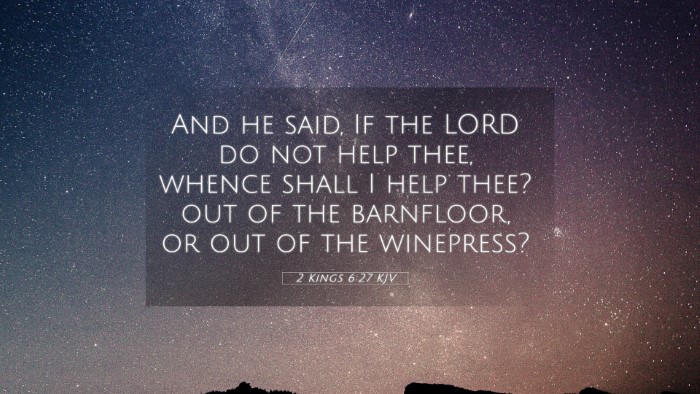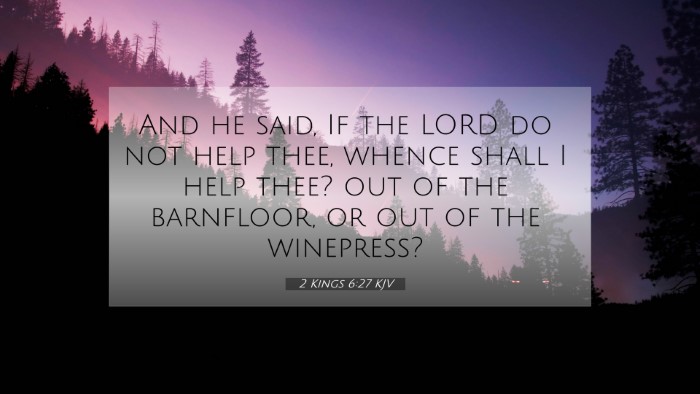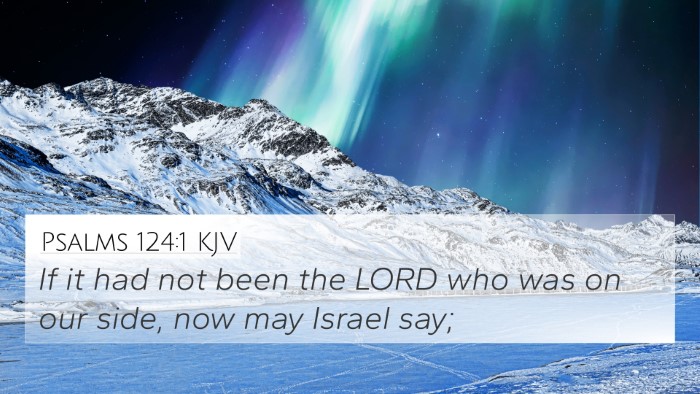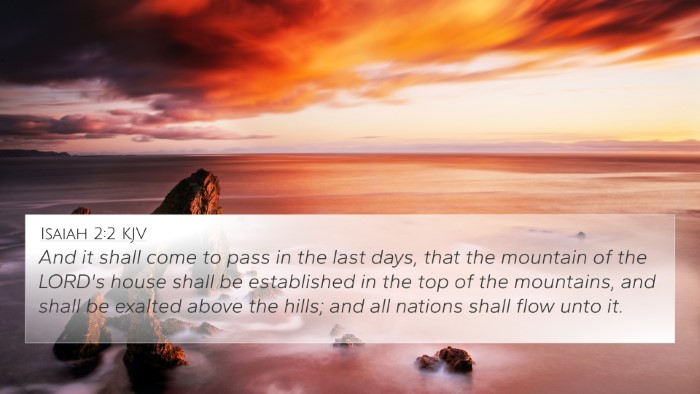In 2 Kings 6:27, we find the king of Israel responding to a desperate situation during a time of famine. He expresses deep despair, indicating that the Lord has distanced Himself from the people, making it difficult to find hope in their circumstances. This verse reveals the profound emotional and spiritual struggles faced by the Israelites during a crisis.
Matthew Henry's commentary elucidates this moment by illustrating the king's feeling of hopelessness. He emphasizes that, in moments of dire need, looking towards God is of utmost importance. The king's response implies a reliance on earthly solutions rather than divine intervention, highlighting a typical human tendency to despair during grave situations. Henry encourages readers to seek God first in times of trouble.
Albert Barnes provides additional insights, noting that the king was impotent in his authority during this crisis. His declaration shows a recognition that neither political power nor military strength can alleviate such suffering without divine assistance. Barnes points out that the king's statement suggests that times of affliction often lead us to recognize our need for God's mercy.
Adam Clarke expands on this theme by discussing the broader implications of the famine. He suggests that the profound desperation seen here is indicative of a nation that has strayed far from God, thus placing their trust in human rulers and not in the Lord. Clarke points out that this incident illustrates the consequences of turning away from divine guidance, leading to societal collapse and suffering.
Key Themes from 2 Kings 6:27
- The importance of seeking God in times of crisis.
- The limitations of human power in the face of calamity.
- The consequences of national sin leading to widespread suffering.
- The need for reliance on divine mercy and grace.
- The spiritual blindness that can lead a nation astray.
Bible Cross-References
- 2 Kings 25:3 - Reflects the consequences of sin and rebellion against God.
- Lamentations 3:40 - Encourages self-examination and returning to the Lord.
- Isaiah 63:17 - Questions God about the hardening of the hearts of the people.
- Jeremiah 14:2 - Discusses the mourning of the people during a time of drought and sorrow.
- Psalm 77:9 - Expresses distress and questions God's mercy when faced with suffering.
- Ezekiel 14:21 - Highlights how even righteous men may not save their countries in times of judgment.
- James 1:5 - Encourages seeking wisdom from God in times of trial.
This verse, therefore, serves as a stark reminder of the need for an inter-Biblical dialogue. The connections between this event and other scriptural references contribute to an understanding of how biblical themes unfold across scripture. For those engaging in Bible cross-reference studies, understanding the relationship between 2 Kings 6:27 and other narratives is crucial.
The panic and despair seen in 2 Kings 6:27 can be cross-referenced with various other instances in the Bible where people faced overwhelming odds, such as the plight of Job (Job 30:20-21) and the Israelites during the Egyptian captivity (Exodus 14:10). In these situations, the common thread of reliance on God during adversity becomes apparent, prompting a deeper investigation into the thematic connections.
Utilizing tools for Bible cross-referencing can aid in effectively navigating through related scriptures. Bible concordances and Bible cross-reference systems can provide comprehensive materials for comparing themes, making connections, and understanding scripture in a more nuanced manner.
In conclusion, 2 Kings 6:27 illustrates a moment of deep despair that speaks volumes about human nature and our tendency to falter during dire circumstances. The insights gathered from contributions by respected commentators highlight the essence of finding hope and direction in God’s word amid confusion and fear. By tracing connections between this verse and others, believers can develop a more profound understanding of the overarching messages within the Scriptures.










